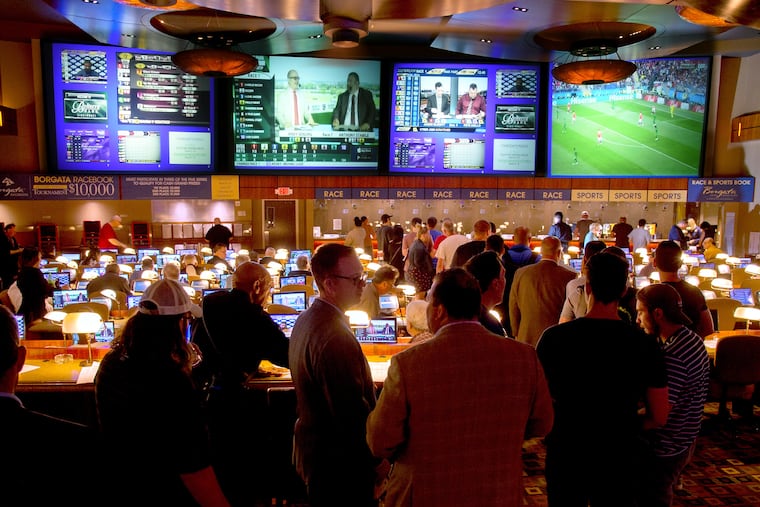At two Philadelphia universities, you can bet on sports, but not on the home team
St. Joseph's and Villanova have drawn a line and adopted policies banning all students, faculty and staff from wagering on any events involving their university’s teams.

Some sports fans tell pollsters they bet on games as a way of showing support for their favorite teams. But in the new world of legalized sports betting, two Philadelphia universities have drawn a line and adopted policies banning all students, faculty, and staff from wagering on any events in which the university’s teams are participating.
St. Joseph’s University recently joined Villanova University and adopted a policy prohibiting all members of the university from betting on games in which the university’s teams are participants. The two private universities are associated with Roman Catholic orders.
“St. Joseph’s University is an institution built on community, in which we encourage all members to support one another in achieving personal, academic, and spiritual growth,” states the amendment to the school’s student handbook.
“Allowing St. Joseph’s University students, faculty, staff, contractors, and members of the Board of Trustees to gamble on the performance of university student athletes or staff members runs contrary to the sense of community that is so critical to the university.”
The policy change was first reported by the St. Joseph’s student newspaper, the Hawk.
Some media portrayed the St. Joseph’s policy as groundbreaking, though Villanova adopted a similar policy last November in the months following the U.S. Supreme Court’s decision that legalized sports betting outside of Nevada.
Purdue University in West Lafayette, Ind., on Thursday became the first known public university to adopt such a ban after Indiana joined 12 other states to legalize sports betting.
State laws on sports betting vary considerably. New Jersey bans bookmakers from taking bets on any games involving universities based in New Jersey, or played in New Jersey. Pennsylvania has few restrictions on betting on college sports. Both states require bettors to be at least 21, which eliminates many undergraduates.
All universities that are members of the NCAA prohibit student athletes and members of athletic departments from any sports betting. And Pennsylvania law prohibits non-insiders from making sports bets on behalf of insiders, such as athletes or team support staff.
The new policies adopted by universities extend those prohibitions to everyone on campus as far as betting on events in which the school’s teams participate, creating kind of a moral ring-fence around the institution.
Athletic department representatives at St. Joseph’s and Villanova said their new policies were not prompted by any unsavory incidents, but by a need to respond to the changes brought about by legalization. “It’s mainly in response to passage of the state law, and to make sure we had a policy in place that affected the entire university,” said Peter Baran, Villanova athletics director of compliance.
Jill Bodensteiner, St. Joseph’s athletics director, said the university felt there was a need to address a void between federal and state laws, and NCAA regulations governing sports integrity. Though it may be legal for faculty or students who are not athletes to bet on the Hawks, it raised potentials for uncomfortable ethical conflicts.
“How would we feel if a faculty member sent an e-mail to a student athlete saying, `You idiot, I put $10,000 on you hitting a free throw, and you missed it’?” said Bodensteiner. “How would we feel about that? The consensus we reached was, we wouldn’t feel good about it.
“Is that the kind of community we want to be, where we’re wagering on fellow members of the community’s success?”
Bodensteiner said the university did not want to ban legal sports betting altogether, which “goes far beyond where we want to be as a community.”
“Betting on the 76ers doesn’t hold that same community or values implication that betting on your classmates does," she said.
After Purdue University adopted a similar ban this week, Michael McCann, a legal analyst for Sports Illustrated, suggested that public universities might find themselves targeted by legal advocates who could argue that banning a legal activity on campus violates First Amendment freedoms.
“It will be interesting to see if other schools in states with legalized sports betting adopt such policies.” McCann wrote. “If they do, and if they are public universities, the likelihood of a legal challenge will rise.”
But St. Joseph’s position as a private university affiliated with a religious institution may put it on more solid ground in terms of addressing the gambling issue as a moral issue.
“I would say our status as a Jesuit university absolutely informed and probably made it an easier discussion," said Bodensteiner, "because we’re so upfront and clear about the importance of mission, and the importance of our Jesuit ideals.”